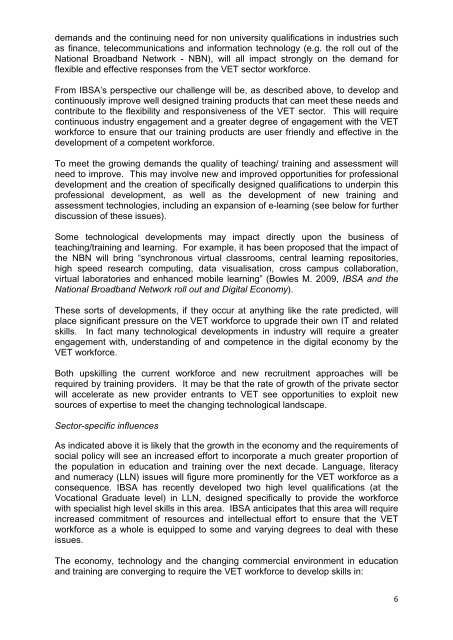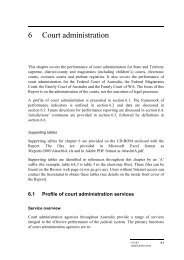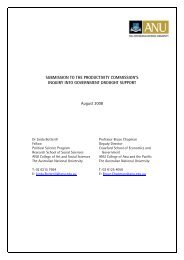Innovation & Business Skills Australia - Productivity Commission
Innovation & Business Skills Australia - Productivity Commission
Innovation & Business Skills Australia - Productivity Commission
Create successful ePaper yourself
Turn your PDF publications into a flip-book with our unique Google optimized e-Paper software.
demands and the continuing need for non university qualifications in industries such<br />
as finance, telecommunications and information technology (e.g. the roll out of the<br />
National Broadband Network - NBN), will all impact strongly on the demand for<br />
flexible and effective responses from the VET sector workforce.<br />
From IBSA’s perspective our challenge will be, as described above, to develop and<br />
continuously improve well designed training products that can meet these needs and<br />
contribute to the flexibility and responsiveness of the VET sector. This will require<br />
continuous industry engagement and a greater degree of engagement with the VET<br />
workforce to ensure that our training products are user friendly and effective in the<br />
development of a competent workforce.<br />
To meet the growing demands the quality of teaching/ training and assessment will<br />
need to improve. This may involve new and improved opportunities for professional<br />
development and the creation of specifically designed qualifications to underpin this<br />
professional development, as well as the development of new training and<br />
assessment technologies, including an expansion of e-learning (see below for further<br />
discussion of these issues).<br />
Some technological developments may impact directly upon the business of<br />
teaching/training and learning. For example, it has been proposed that the impact of<br />
the NBN will bring “synchronous virtual classrooms, central learning repositories,<br />
high speed research computing, data visualisation, cross campus collaboration,<br />
virtual laboratories and enhanced mobile learning” (Bowles M. 2009, IBSA and the<br />
National Broadband Network roll out and Digital Economy).<br />
These sorts of developments, if they occur at anything like the rate predicted, will<br />
place significant pressure on the VET workforce to upgrade their own IT and related<br />
skills. In fact many technological developments in industry will require a greater<br />
engagement with, understanding of and competence in the digital economy by the<br />
VET workforce.<br />
Both upskilling the current workforce and new recruitment approaches will be<br />
required by training providers. It may be that the rate of growth of the private sector<br />
will accelerate as new provider entrants to VET see opportunities to exploit new<br />
sources of expertise to meet the changing technological landscape.<br />
Sector-specific influences<br />
As indicated above it is likely that the growth in the economy and the requirements of<br />
social policy will see an increased effort to incorporate a much greater proportion of<br />
the population in education and training over the next decade. Language, literacy<br />
and numeracy (LLN) issues will figure more prominently for the VET workforce as a<br />
consequence. IBSA has recently developed two high level qualifications (at the<br />
Vocational Graduate level) in LLN, designed specifically to provide the workforce<br />
with specialist high level skills in this area. IBSA anticipates that this area will require<br />
increased commitment of resources and intellectual effort to ensure that the VET<br />
workforce as a whole is equipped to some and varying degrees to deal with these<br />
issues.<br />
The economy, technology and the changing commercial environment in education<br />
and training are converging to require the VET workforce to develop skills in:<br />
6

















